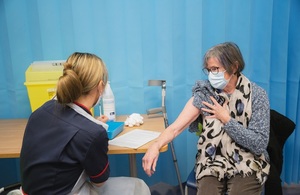One year anniversary of UK approving Oxford/AstraZeneca COVID-19 vaccine
A year ago today, the UK became the first country in the world to approve the Oxford University/AstraZeneca vaccine.
The UK became the first country in the world to approve the Oxford University/AstraZeneca COVID-19 vaccine a year ago today (Thursday 30 December).
Early investment in the Oxford team – in their technology since 2016 and their COVID-19 vaccines since March 2020 – paved the way for approval by the independent Medicines and Healthcare products Regulatory Agency (MHRA), driven forward by the National Institute for Health Research’s (NIHR) world leading research. The NIHR helped recruit thousands of volunteers from across the UK for phase 3 trials and supported the researchers.
Almost 50 million AstraZeneca vaccines have been administered in the UK, saving countless lives, keeping people out of hospital and reducing the pressure on the NHS.
Following the government investing more than £88 million to help research, develop and manufacture the vaccine, around 2.5 billion doses have been distributed at cost to more than 170 countries. Almost two-thirds of these have gone to low and lower-middle-income countries, including more than 30 million doses donated by the UK through COVAX or bilaterally. The UK will donate a further 20 million AstraZeneca doses to countries in need next year as part of the government’s commitment to donate 100 million doses overall.
Prime Minister Boris Johnson said:
Our fight against COVID-19 in the UK and around the world would not have been possible without the Oxford-AstraZeneca vaccine.
Developed by brilliant scientists at Oxford and delivered on a not-for-profit basis thanks to AstraZeneca, this vaccine has provided 50 million doses to the British public and over 2.5 billion to more than 170 other countries.
We can all be incredibly proud of – and grateful for – a jab that has saved many millions of lives.
Health and Social Care Secretary Sajid Javid said:
Today marks one year since the UK made history by being the first country in the world to approve the Oxford-AstraZeneca vaccine – a UK-made and government-funded vaccine which has been absolutely pivotal in helping to save millions of lives around the world.
I’m incredibly proud of the role the UK has played in developing, researching and manufacturing ground-breaking vaccines and treatments during the pandemic.
Vaccines are the best way to protect people from COVID-19 and I’m urging everybody to play their part in this national mission – roll up your sleeves and get your jabs.
Vaccines Minister Maggie Throup said:
One year on, the Oxford-AstraZeneca vaccine has played a crucial part in our fight against COVID-19, saving the lives of the most vulnerable and helping to reduce the spread of the virus.
It’s a remarkable example of British innovation and scientific excellence – please take advantage and get your vaccines as soon as you can to protect yourself this winter.
The COVID-19 vaccination programme is the largest in British history and was established at unprecedented speed, with thousands of vaccine centres set up rapidly in England, meaning around 98% of people live within 10 miles of a vaccination clinic.
The government’s Vaccine Taskforce secured early access to almost 340 million doses of the most promising vaccine candidates in advance for the entire UK, Crown Dependencies and Overseas Territories, enabling a rapid deployment once approved by the medicines regulator.
The UK led the world in vaccine research, providing results for 3 of the successful vaccine candidates through huge phase 3 trials for Oxford AstraZeneca, Janssen and Novavax vaccines. The Novavax trial is the largest ever double blind placebo controlled trial in the UK, recruiting 15,000 participants from 35 research sites in just over 2 months.
Tom Keith-Roach, President of AstraZeneca UK, said:
I am quietly humbled and hugely proud of the work we have done together to get 50 million doses into people’s arms here in the UK and over 2.5 billion doses to people in over 170 countries globally in less than 12 months.
This has only been possible thanks to the tireless efforts and is to the huge credit of so many colleagues, partners, healthcare workers, volunteers and members of the public who have stepped forward to support this unprecedented national effort.
There remain huge challenges ahead, much vital work is still to be done, but in 2021 we achieved remarkable things and this should give us confidence and renewed hope for 2022.

